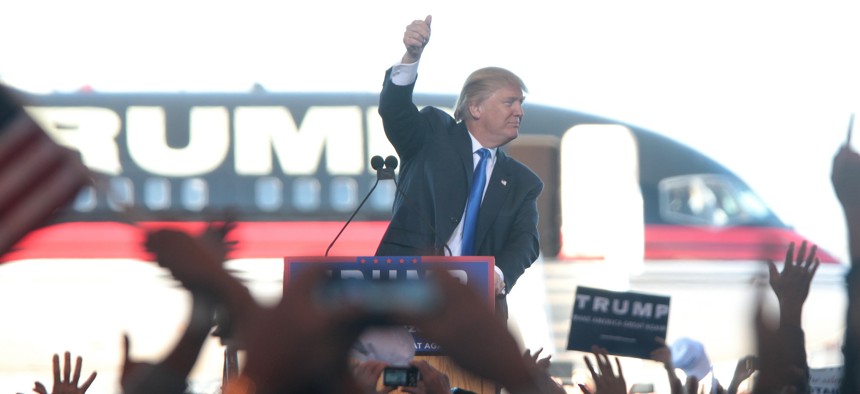
Flickr user Gage Skidmore
Donald Trump Isn't Sorry
The Republican candidate refuses to apologize for his mistakes—and that may be key to his success.
Being Donald Trump means never having to say you’re sorry.
That, he explained to Jimmy Fallon last September, is among the advantages of never being wrong. “I fully think apologizing is a great thing, but you have to be wrong … I will absolutely apologize sometime in the distant future if I'm ever wrong.”
Instead of apologizing swiftly, assuming responsibility, and putting controversies behind him, Trump prefers to deny potential problems, disclaim responsibility, and move on to some fresh controversy. It flies in the face of decades of accrued wisdom about how to handle political crises. And it appears to be working for him.
That’s one way to understand the weekend’s controversy over an ill-advised tweet. On Saturday morning, Trump shared an image showing Hillary Clinton’s “History Made” logo superimposed on a pile of cash, and a six-pointed star with the words, “Most Corrupt Candidate Ever!”
When social-media users quickly objected that the conjunction of the star and the cash seemed to traffic in anti-Semitic tropes, Trump took the rare step of deleting and replacing it:
Crooked Hillary -- Makes History! #ImWithYou #AmericaFirst pic.twitter.com/PKQhYhMmIX
— Donald J. Trump (@realDonaldTrump) July 2, 2016
He offered no apology, no admission of error, and no explanation. Mic’s Anthony Smith traced the image back to 8chan’s /pol/ message board, an internet haven for the alt-right, and from there to a Twitter account that regularly posts overtly racist and anti-Semitic images. The Clinton campaign quickly pounced. “Donald Trump’s use of a blatantly anti-Semitic image from racist websites to promote his campaign would be disturbing enough, but the fact that it’s part of a pattern should give voters major cause for concern,” it said in a statement.
By Sunday night, the Trump campaign apparently felt compelled to respond, issuing twinned statements from Trump and his campaign’s social-media director, Dan Scavino. “The social media graphic used this weekend was not created by the campaign nor was it sourced from an anti-Semitic site,” Scavino said. “It was lifted from an anti-Hillary Twitter user where countless images appear.” He explained that he’d seen the image not as a Star of David, but as a law-enforcement logo. “The sheriff’s badge—which is available under Microsoft’s ‘shapes’—fit with the theme of corrupt Hillary, and that is why I selected it.” And Scavino concluded, “As the social-media director for the campaign, I would never offend anyone and therefore chose to remove the image.”
It’s a minor classic of its genre. There’s the arms-length distancing from the problem. The introduction of irrelevant information—Sheriffs! Microsoft!—to cloud the issue. And the concluding sorry-if-you-were-offended half apology.
But if Scavino was playing the usual game of crisis communications, Trump was working from an entirely different rulebook:
These false attacks by Hillary Clinton trying to link the Star of David with a basic star, often used by sheriffs who deal with criminals and criminal behavior, showing an inscription that says “Crooked Hillary is the most corrupt candidate ever” with anti-Semitism is ridiculous.
He showed no concern with having given offense. He made no acknowledgment of the image’s actual origins. And he certainly didn’t apologize
It’s wholly plausible that Trump didn’t give the star a second thought before he sent the tweet, that he saw it as a “basic star” or a sheriff’s badge. Trump has a genius for repurposing images and slogans, drawing them from an eclectic array of sources. Ronald Reagan urged, “Let’s make America great again!” America First has been a slogan used by politicians from Woodrow Wilson to William Randolph Hearst. It’s not always clear that Trump knows, or cares, about their origins.
But in this case, the star was not, in fact, a sheriff’s badge. In the 1980 Canadian drama The Lucky Star, the hero, a Dutch teenager named David Goldberg, pretends that the six-pointed yellow star the Nazis have ordered him to wear is actually a sheriff’s badge. It was an escapist fantasy, a way of divorcing himself from the ugliness of his reality, and denying the actual meaning of the symbol. Until this weekend, it may have been the only time anyone else proved unable to distinguish between the two hexagrams.
It’s not Clinton who’s trying to link the image with anti-Semitism; the Twitter account from which, in Scavino’s telling, it was taken was laden with images that trafficked in such tropes, with no particular ambiguity or subtlety. Instead of arguing that he meant nothing wrong, or acknowledging his error in sharing the image, though, Trump baldly denied any problem with it.
He can’t be sorry, because he’s never wrong.
Back in 2004, Talking Points Memo’s Josh Marshall observed that presidential elections are, as much as anything, battles to demonstrate “strength, toughness or resolve,” and that each of these traits is “a personal, characterological quality rather than one rooted in policy.” In other words, for many voters, where the candidates stand is less important than how firmly they plant their feet.
There is, moreover, research to back that approach—evidence shows that apologies hurt more than they help and that many find overconfidence and a willingness to discard rules attractive. Trump appears willing to put that to the test, gambling that he can win by projecting certainty and confidence, that voters would rather have a self-assured leader than one willing to acknowledge missteps.
And he’s not sorry.
(Image via Flickr user Gage Skidmore)






